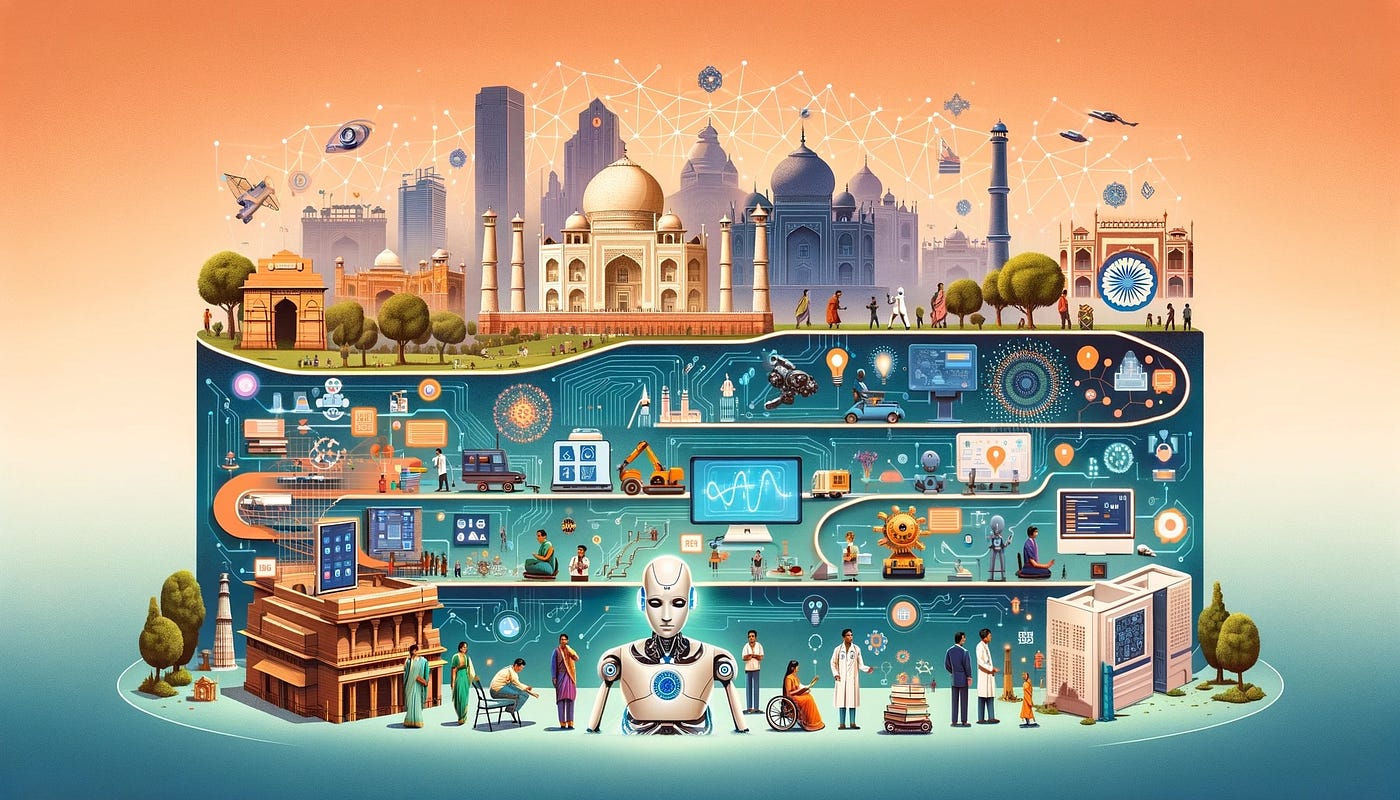India, with its vast technological workforce and growing digital ecosystem, is experiencing a significant transformation through artificial intelligence (AI). From bustling metro cities to smaller towns, AI is gradually weaving itself into the fabric of daily life, business operations, and government initiatives. Let's understand how India is adapting to this technological revolution and what it means for 1.4 billion citizens.
The Current Landscape

India's AI journey is unique, characterized by a blend of traditional challenges and modern solutions. The country's IT sector, which has long been its strength, is now pivoting towards AI-driven innovations.
According to NASSCOM, India's AI market is expected to grow significantly, with both domestic companies and international giants setting up AI research centers across cities like Bangalore, Hyderabad, and Pune.
Government Initiatives
The Indian government has shown strong commitment to AI adoption through various initiatives:
-Digital India: This flagship program has created the foundation for AI adoption by improving digital infrastructure and internet connectivity across the country.
-National AI Strategy: The government's think tank, NITI Aayog, has developed a comprehensive approach to implementing AI across sectors like healthcare, agriculture, and education.
-AI Research Centers: Several Centers of Excellence for AI have been established in partnership with leading educational institutions like IITs and IIITs.
How Indians Are Adapting to AI
In Daily Life
The average Indian citizen is increasingly encountering AI in their daily routines:
-Digital Payments: Apps like PhonePe and Google Pay use AI for fraud detection and personalized recommendations

-Language Translation: AI-powered tools are helping bridge the language divide in a country with 22 official languages
-Entertainment: Streaming platforms like Hotstar and Netflix use AI to suggest content in multiple Indian languages

-Transportation: Ride-hailing apps use AI for route optimization and pricing
In Healthcare
The healthcare sector has seen significant AI adoption:
Hospitals are using AI for early disease detection
Telemedicine platforms are leveraging AI for preliminary diagnoses
Rural areas are benefiting from AI-powered health camps and mobile diagnostic units
In Education
The education sector is witnessing a transformation:
-Online Learning: Platforms like BYJU'S and Unacademy use AI to personalize learning paths
-Regional Language Support: AI-powered translation making education accessible in local languages
-Automated Assessments: Schools adopting AI-based evaluation systems
Challenges and Adaptations
Digital Divide
While urban India embraces AI rapidly, rural areas face challenges:
-Limited internet connectivity in remote areas
-Need for more digital literacy programs
-Cost barriers for accessing AI-powered services
To address these issues, various initiatives are underway:
-Government programs for digital literacy
-Public-private partnerships for infrastructure development
-Low-cost AI solutions designed for rural use
Workforce Transformation
The Indian workforce is adapting to AI in different ways:
-Upskilling: Professionals across sectors are learning AI-related skills
-New Job Roles: Emergence of AI specialists, data scientists, and ML engineers
-Traditional Sectors: Industries like agriculture and manufacturing incorporating AI tools
Small Business Adoption
Small and medium enterprises (SMEs) are finding innovative ways to use AI:
-Customer service chatbots in local languages
-Inventory management systems
-Marketing automation tools
Success Stories
Agriculture
Farmers are increasingly using AI-powered solutions:
-Crop disease detection through smartphone apps
-Weather prediction for better crop planning
-Soil health analysis using AI sensors
Banking
The banking sector shows strong AI adoption:
-AI-powered credit scoring systems
-Fraud detection mechanisms
-Automated customer service
Public Perception and Cultural Impact
The Indian public's perception of AI is evolving:
Positive Aspects:
-Excitement about technological advancement
-Appreciation for convenience in daily tasks
-Recognition of economic opportunities
Concerns:
-Job displacement fears
-Data privacy issues
-Cost of adoption
Future Outlook
India's AI journey shows promising signs:
-Growing Investment: Both government and private sector increasing AI funding
-Startup Ecosystem: Rising number of AI startups solving India-specific problems
-Skills Development: Focus on AI education at various levels
-Innovation Hub: India positioning itself as a global AI innovation center
The Way Forward
For continued AI adoption and growth in India, several factors are crucial:
-Inclusive Development: Ensuring AI benefits reach all sections of society
-Infrastructure Development: Continued improvement in digital infrastructure
-Policy Framework: Balanced regulations supporting innovation while protecting privacy
-Education: Enhanced focus on AI skills at all educational levels
India's relationship with AI is rapidly evolving, marked by innovative adaptations to local needs and challenges. While urban areas lead in adoption, efforts are underway to extend AI benefits to rural regions. The combination of government initiatives, private sector innovation, and public acceptance is creating a unique ecosystem for AI development and implementation.
The journey hasn't been without challenges, but the Indian approach of finding local solutions to global technological advances is proving effective. As AI continues to evolve, India's massive youth population, technical expertise, and growing digital infrastructure position it well to become a significant player in the global AI landscape.
The true success of AI in India will be measured not just by technological advancement, but by how it improves the lives of its diverse population. With continued focus on inclusive growth and practical applications, AI has the potential to transform India's digital landscape while addressing its unique social and economic challenges.
